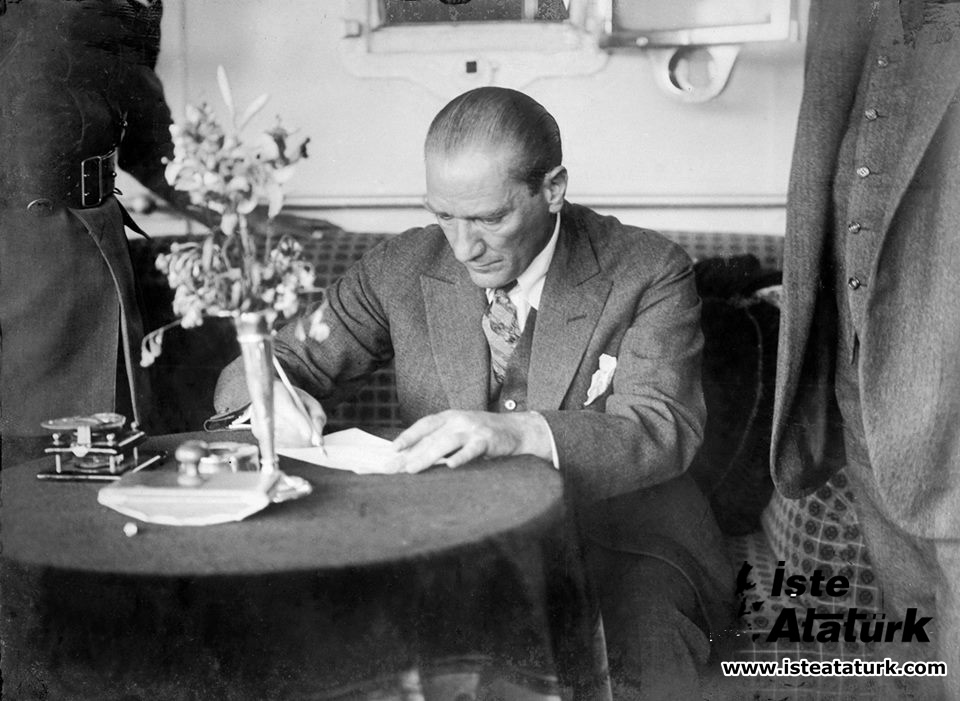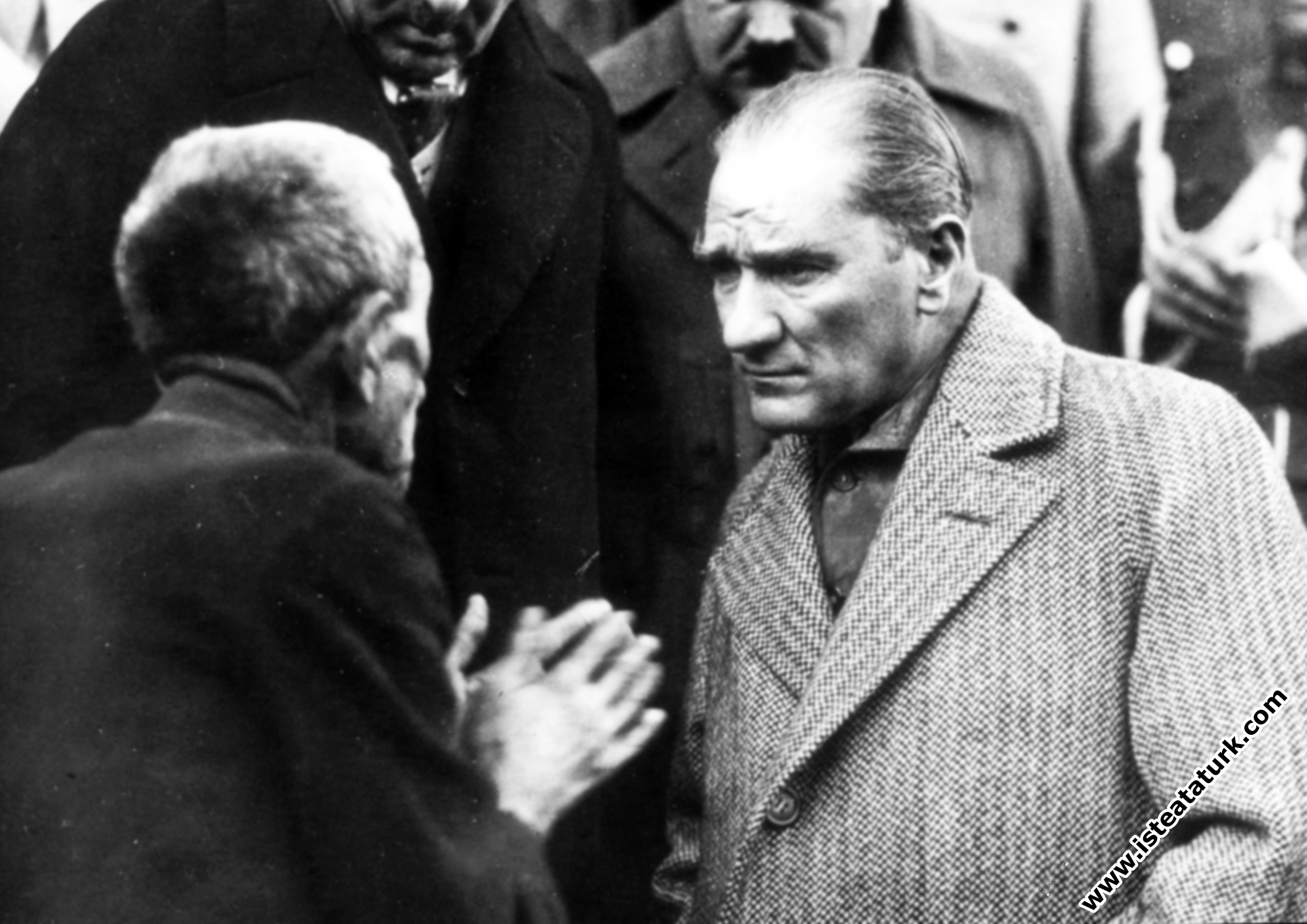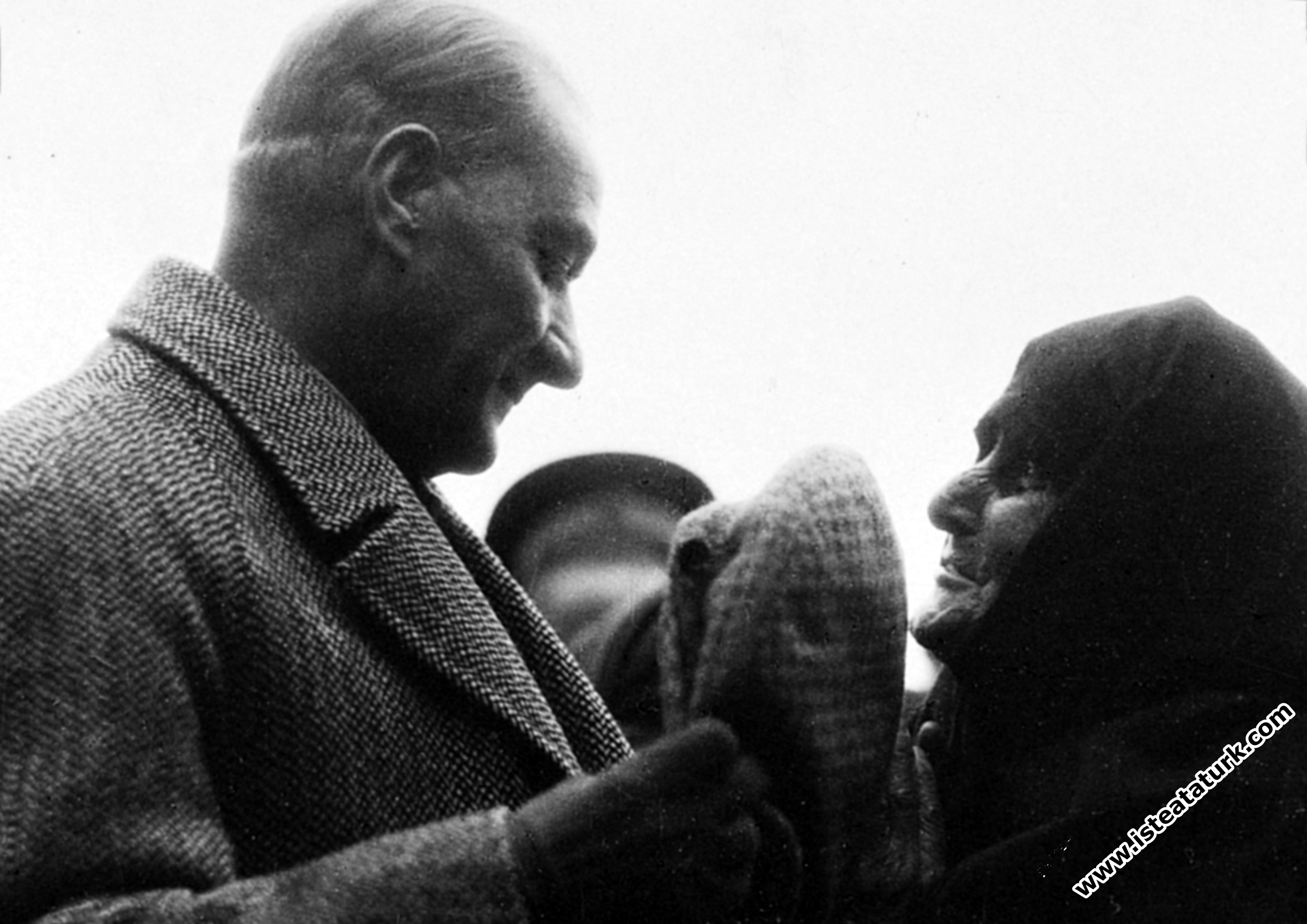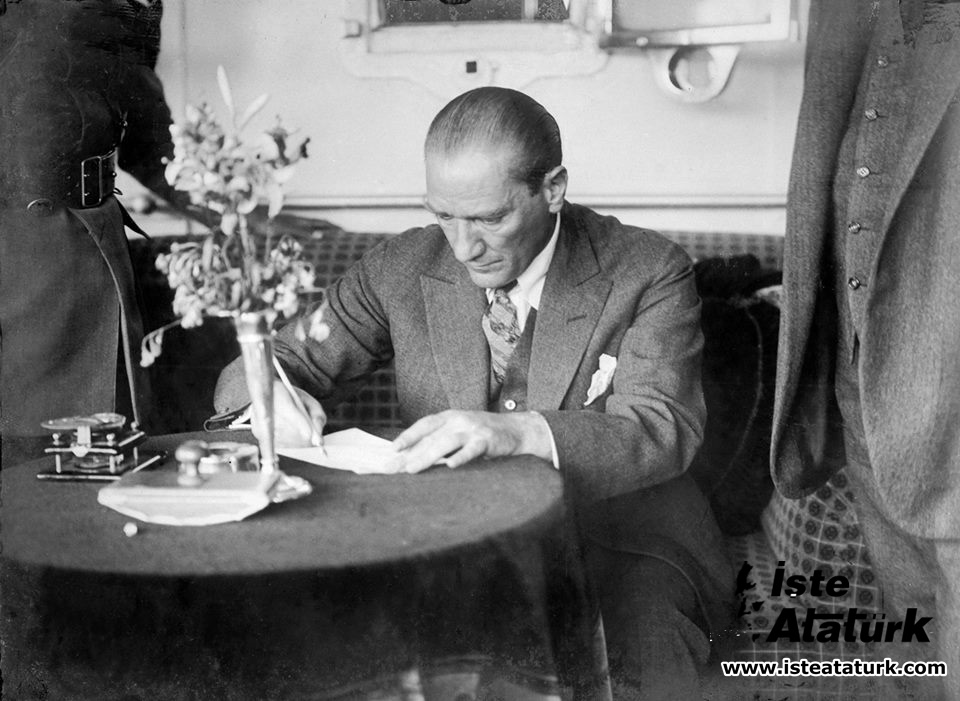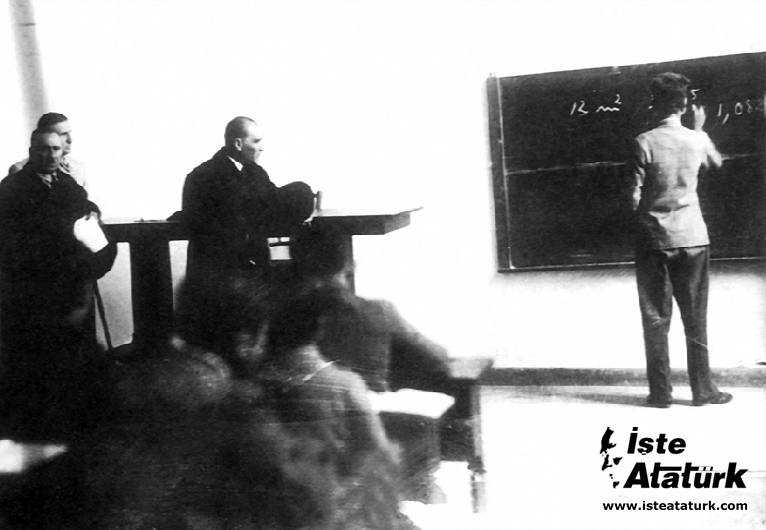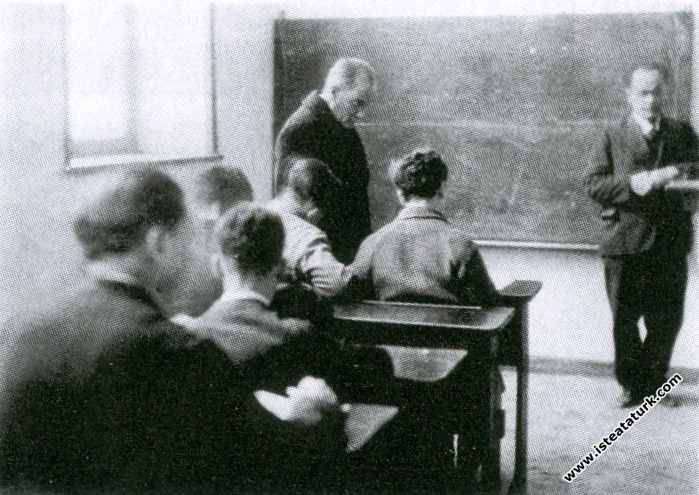
On Atatürk's Principles and Revolutionism
Character Size
ABOUT ATATURK'S PRINCIPLES AND REVOLUTIONARY
I
As known; In the Kemalist Thought System, “Secularism” is not only the principle of separation of religion and state, but also a lifestyle, a rational and scientific perspective on world and social problems.
For this reason, secularism is inseparable from the main goal of Turkey's modernization and is specially protected in our Constitutions. According to the last paragraph of Article 24 of the 1982 Constitution, basing the basic order of the state on religious rules and exploiting religious sentiments were prohibited for this reason. Finally, Article 174, which aims to preserve the quality of secularism and to protect the Revolution laws set forth in the Constitution, was adopted for this purpose.
The Turkish Revolution is considered one of the most important revolutions of the recent era. Because, this revolution also changed the basis of political society from “Ummet” to “Nation”, changed the basis of political power from “Personal Sovereignty” to “Nation Sovereignty”, replaced the “Theocratic State” structure with “Secular State” structure, and with “Modernization” He rescued a society that faltered between "traditionalism" from this "duality" and turned its face to contemporary Western civilization irreversibly. Both "revolution" and "revolution" While Revolutionism rejects the idea that societies develop slowly according to their own evolutionary laws, it requires the resurrection of the old order, the establishment of a solid order that will prevent attempts to "revive the old - restoration", and it requires not to make "concessions - concessions" from the basic principles of the revolution. At the Izmit Press Conference in 1923, Atatürk said, confronted with concessionism and opportunism; He said, “Idare-i maslahatists cannot make revolutions”.
On the other hand, revolutionism necessitates being vigilant and determined against attempts to overthrow the revolution and revive the old regime. Especially like the Turkish Revolution, it is always possible for a cultural revolution that aimed to eliminate the outdated values and traditions of centuries, to encounter the active resistance of many people. It is the duty of the revolutionaries to resolutely protect the revolution against such reactions, because laxity or excessive tolerance in this area endanger the whole of the revolution.
Atatürk said, “We made a great revolution. We took the country from one era and brought it to a new era. We destroyed many old establishments. They have thousands of fans. Even in the most advanced democracies, measures have been applied to protect the regime. As for us, we need more measures to protect the revolution," he said. The 1982 Turkish Constitution took measures to protect the revolution compatible with modern democracy. The reflection of the Turkish Revolution in the 21st century will be provided by the "Revolutionary Principle", which is not "static" but "dynamic". It will be in the direction of modernization under the guidance of reason, science and advanced technology.
Included in the CHP Program established by Atatürk and expressing some goals; There are doubts as to whether the principles known as "Six Arrows", which reflect the fundamental ideas of the party such as Republicanism, Populism, Nationalism, Secularism, Statism and Revolutionism, reflect all Atatürk's Principles.
Those who did not have the opportunity to adequately examine the Kemalist Thought System believe that the Six Arrows, which were accepted and announced as the principles of the CHP in the 1927 Congress and the 1931 Congress, have the same meaning as the "Ataturk's Principles", in short, the Ataturk's Principles from Six Arrows. We know they count.
The main reason for this is that Mustafa Kemal was the founder and first chairman of the CHP, in other words, the People's Party, which was founded by Mustafa Kemal on September 9, 1923, as a continuation of the "Anatolian and Rumelian Defense of Rights Association", was founded in 1924. It is the principles of the organization named “Republican People's Party”.
Indeed, the People's Paragraph, which turned from an association to a party, changed its name to the "Republican People's Party" (CHP) on November 10, 1924, after the proclamation of the Republic, and was accepted as the "People's Party Regulation" between August 7 and September 11, 1923. This first regulation of the CHP, which remained in force with minor changes until the new one was made in 1927, was replaced by the II. It was the basis that guided the work of the Party until the General Assembly, and to be honest, there was no mention of the CHP's program until 1931, other than this “Regulation of Paragraph”.
The CHP's II. The statute adopted at the General Assembly constituted a more detailed document than the “Regulation of Subsection” adopted on September 9, 1923, and the 1st article of this statute defined the CHP as a Republican, Populist and Nationalist political organization. In 1931, the CHP's III. The congress was convened and the first party program was accepted in this convention, thus a distinction was made between the "Party Program" and the "Party Bylaws".
Briefly; The principles of Republicanism, Populism and Nationalism, which were stated as the principles of the CHP in the 1927 Convention, were added to the principles of Secularism, Statism and Revolution in the 1931 Convention, and the “Six Principles” reflecting the basic ideas of the Party were accepted and announced by the Convention.
The CHP, which met on May 9, 1935, IV. In the "Introduction" section of the 1935 Program that was accepted at the Congress; The phrase "Kemalism" was included in the CHP program for the first time by adding the sentence "These principles are the principles of Kemalism". Upon the death of Mustafa Kemal in 1938, the I. Extraordinary Congress convened on December 26, 1938, and elected İnönü as the "Unchangeable President" as the Chairman of the CHP. İnönü, who was also the President, defended the "Six Arrows of Kemalism". defended the idea of “to protect and preserve”. The idea that Six Arrows reflected all Atatürk's Principles probably stemmed from these events, and the principles of Kemalism such as national sovereignty, loyalty to reason and science, peace at home and peace in the world, national unity and solidarity, and the indivisibility of Turkey with its nation and country were overlooked.
II
Indeed, those who do not have the opportunity to adequately examine Atatürk and the new Kemalist Thought System regard Atatürk's Principles as "Six Arrows" expressing some of the goals of the CHP's program established by Atatürk. However, "Atatürk's Principles" cannot be limited to Six Arrows. As a matter of fact, Kemalism has other and important principles such as "National Sovereignty, Commitment to Reason and Science", "Peace at Home and Peace in the World" and "National Unity and Solidarity".
Indeed, Atatürk's example; We see that he attaches great importance to the principle of "National Unity and Togetherness" and expresses this on various occasions. In his “Tenth Year Speech”, he said, “We have done a lot and great things in a short time. After saying that the biggest of these works is the Republic of Turkey, which is based on Turkish heroism and high Turkish culture, he adds the words, "We owe the success in this matter to the resolute march of the Turkish nation and its valuable army," adding the necessity of doing more and greater works, He says that the Turkish nation, who knows how to defeat the forces with national unity and solidarity, will achieve it, and that it is our national ideal to develop our nation's sense of national unity by feeding it.
Emphasizing that nationalism does not mean "ethnic racism" by saying "The people of Turkey who founded the Turkish Republic are called the Turkish nation", Atatürk said in 1929; “Within the political and social community of today's Turkish nation, we have citizens and fellow citizens who are trying to propagate the idea of Kurdishness, Circassianism, and even Lazism or Bosnianism. However, these misnomers, which are the products of the tyranny of the past, have had no effect on any nation, other than a few reactionary and foolish people who have become an instrument of the enemy, but have caused grief. Because the members of this nation have the same common past, history, morals and law as the general Turkish society.
Atatürk had the same opinion in 1932; By repeating the words “Diyarbakir, Van, Erzurumlu, Trabzon, Istanbul, Thracian and Macedonian are all the sons of a race, they are the veins of the same ore”, he added the following in 1935: “The most valuable asset of a country is national unity, good living and hard work among its citizens. maturity of their emotions and abilities. It is the most important weapon and means of protection of a nation that it has decided to immediately put forth the lives and everything of all citizens in order to protect the nation's existence. On the other hand, Mustafa Kemal's view that the National Struggle was won with national unity and solidarity, that is, as a nation, in 1925; “The one who made the National Struggle is the nation itself, the children of the nation. The nation has adopted the struggle with their mothers and nurses as their ideal, the National Struggle is the national ideal.
Mustafa Kemal Atatürk's opinion on all kinds of separatist games that are plotted against Turkey and aiming to set the citizens against each other is contained in the following statement in 1929: “Trials aimed at disrupting the social order of the Turkish nation are doomed to drown. The Turkish nation is not a community that will not understand and tolerate the secret and dirty intentions of the corrupt, despicable, stateless and nationalityless fools who want to work against the high interests of themselves and their country. He sees the right path as it has been until now, those who want to deviate him from his path are doomed to be crushed and crushed.”
Acting on the principle of national unity and solidarity, Atatürk's conviction for the unity and indivisibility of the homeland is contained in his statements in 1924 and 1927; “The whole world should know that the Turkish nation is capable of promoting its rights, dignity and honor. For one inch of the land of the Turkish homeland, the whole nation stands up as a body... A nation that knows how to work for the homeland with a single individual, with determination and decision, is of course a nation deserving and well-deserved for a great future.” As a matter of fact, the great dimensions reached by the "Come on Turkey - Hand in Hand with Mehmetçik" aid campaign, initiated by TRT in 1995, constituted a very good example of the principle and spirit of "National Unity and Solidarity".
III
Incidentally, we would like to briefly dwell on the subject of “Revolution Laws”. As it is known, article 153 of the 1961 Constitution, under the heading "Protection of the Laws of the Revolution", enumerated eight laws that aim to ensure that Turkish society reaches the level of modern civilization and protect the secular character of the Republic of Turkey. continued. The reason for the protection of the laws of revolution; In the justification of Article 153 and Article 174 of the 1982 Constitution; “The Turkish nation has become conscious of these reforms. However, since those who could not understand the meaning of Atatürk's Revolutions appeared from time to time, this arrangement was seen on the spot," and stated the need to protect the reforms. However, apart from the eight laws that are protected in the Constitution, there are also reform laws. As a matter of fact, it cannot be denied that laws numbered 697 and 698 have this quality. Indeed, following the 1961 Constitution, protected by Article 174 of the 1982 Constitution, for example, the Law on the Wearing of a Hat and the Acceptance of International Numerals, the International Clock and Calendar, whose 70th anniversary we celebrate, the Week Holiday Law, which makes Sunday a holiday instead of Friday, and the 21st It is difficult to say that there is a difference between the Surname Law dated June 1934 in terms of preserving the principle of secularism and modernization. For this reason, it can be thought that the makers of the constitution, while arranging the article "Protection of Revolution Laws", only put "more violated Revolution Laws" on the list. For example, it is difficult to say that there is a difference between the laws on the Wearing of Hats and the Acceptance of International Numbers, the International Clock and Calendar with which we celebrate the 70th anniversary, the Week Holiday Law, which makes Sunday a holiday instead of Friday, and the Surname Law dated 21 June 1934 in terms of preserving the principle of secularism and modernization. For this reason, it can be thought that the makers of the constitution, while arranging the article "Protection of Revolution Laws", only put "more violated Revolution Laws" on the list. For example, it is difficult to say that there is a difference between the laws on the Wearing of Hats and the Acceptance of International Numbers, the International Clock and Calendar with which we celebrate the 70th anniversary, the Week Holiday Law, which makes Sunday a holiday instead of Friday, and the Surname Law dated 21 June 1934 in terms of preserving the principle of secularism and modernization. For this reason, it can be thought that the makers of the constitution, while arranging the article "Protection of Revolution Laws", only put "more violated Revolution Laws" on the list.
The protection formula envisaged by the Constitution for the Revolution Laws; It is in the form that “the provisions of these laws, which were in force at the time the Constitution was adopted by popular vote, cannot be understood or interpreted as being inconsistent with the Constitution”. The meaning and scope of this formula in the Turkish Constitutional Law Doctrine has been evaluated as follows; These laws cannot be claimed to be unconstitutional and the Constitutional Court cannot decide to cancel them. Even if an application is made to the Constitutional Court by mentioning the unconstitutionality of these laws, the Constitutional Court will not find these laws unconstitutional, which aim to bring Turkish society to the level of contemporary civilization and to preserve the secular character of the Republic of Turkey. Because, the authority of the Constitutional Court in terms of these laws was previously limited. However, these laws It can be changed like any other law. However, there is a strong possibility that the law or laws amending them will be annulled by the Constitutional Court. It can be said that these laws, which are counted among the "qualities", cannot be changed by the Legislature, like other laws, by way of constitutional amendment, and even cannot be proposed to be changed. In fact, such a behavior is not expected from the MPs who swear that they "will abide by the Principles and Revolutions of Atatürk" pursuant to Article 81 of the Constitution. However, there is a strong possibility that the law or laws amending them will be annulled by the Constitutional Court. It can be said that these laws, which are counted among the "Qualities", cannot be changed by the Legislature, like other laws, by way of constitutional amendment, and even cannot be proposed to be changed. In fact, such a behavior is not expected from the MPs who swear that they "will abide by the Principles and Revolutions of Atatürk" pursuant to Article 81 of the Constitution. However, there is a strong possibility that the law or laws amending them will be annulled by the Constitutional Court. It can be said that these laws, which are counted among the "qualities", cannot be changed by the Legislature, like other laws, by way of constitutional amendment, and even cannot be proposed to be changed. In fact, such a behavior is not expected from the MPs who swear that they "will abide by the Principles and Revolutions of Atatürk" pursuant to Article 81 of the Constitution. Apart from the fact that the protection regime envisaged for the Revolution Laws listed in the article is not limited to this article, these laws, which are considered among the "Characteristics of the Republic" according to the provisions of the "Preamble" Articles 2 and 4 of the Constitution, cannot be changed by the Legislature in a way that loses its meaning like other laws, It can be said that they cannot be changed by way of constitutional amendment, or even proposed to change them. In fact, such a behavior is not expected from the MPs who swear that they "will abide by the Principles and Revolutions of Atatürk" pursuant to Article 81 of the Constitution. Apart from the fact that the protection regime envisaged for the Revolution Laws listed in the article is not limited to this article, these laws, which are considered among the "Characteristics of the Republic" according to the provisions of the "Preamble" Articles 2 and 4 of the Constitution, cannot be changed by the Legislature in a way that loses their meaning like other laws, It can be said that they cannot be changed by way of constitutional amendment, or even proposed to change them. In fact, such a behavior is not expected from the MPs who swear that they "will abide by the Principles and Revolutions of Atatürk" pursuant to Article 81 of the Constitution. It can be said that they cannot be changed by way of constitutional amendment, or even proposed to change them. In fact, such a behavior is not expected from the MPs who swear that they "will abide by the Principles and Revolutions of Atatürk" pursuant to Article 81 of the Constitution. It can be said that they cannot be changed by way of constitutional amendment, or even proposed to change them. In fact, such a behavior is not expected from the MPs who swear that they "will abide by the Principles and Revolutions of Atatürk" pursuant to Article 81 of the Constitution.
IV
As is known, Nationalism is one of the basic principles of the Kemalist Thought System. The National Struggle was won based on Turkish Nationalism and the determination of the Turkish nation to live independently. Atatürk is a leader who destroyed the feeling of inferiority that covered the hearts of some semi-intellectuals during the collapse of the Ottoman Empire, announced the happiness and pride of being Turkish to the whole nation, strengthened Turkish nationalism and placed it on the right line. Atatürk's unifying, aggregating, uplifting, contemporary and civilized understanding of Nationalism, which we can call Atatürk's Nationalism. Today, it is a solid guide to protect our independence, national unity and integrity against all kinds of totalitarian ideologies and to find the right path in our relations with other nations.
Indeed, weariness and intimidation were so common during the Armistice years that many intellectuals suggested the establishment of a mandate administration in Turkey, while the Treaty of Sèvres was imposed on the Istanbul Government without discussion, while Clemenceau was pouring out movements on the Turkish nation. On the other hand, Mustafa Kemal, in the report he sent to Istanbul after he landed in Samsun, says, “The nation exists as one and has targeted the feeling of Turkishness”. In the telegram he sent to the British Admiral Calthorpe Lord Curzon in Istanbul, he made the correct diagnosis that "Mustafa Kemal, who had gained great fame in the Çanakkale Wars, has made himself the center of nationalist sentiment since his arrival in Samsun as an army inspector." He referred to them as "Nationalists".
Atatürk's understanding of Nationalism cannot come together with Communism, which is diametrically opposed to Nationalism, and it is also incompatible with racism, totalitarian Fascism, Chauvinism, and advocacy for theocratic order. In addition, the feeling of nation and the reality of nation are stronger than class and theocratic, that is, Marxist and ummatist ideologies that deny the nation. The French thinker Ernest Renan wrote “What is a Nation?” in the Sorbonne in 1882. In his conference, he stated that the reality of the nation is based, first of all, on the sense and determination of the individuals who brought that nation into being, on the common culture, the unity of spirit and purpose, kneaded by the past lived together. Atatürk described the nation as "a society formed by people from the same culture", starting from 1924,
Indeed, in the 1924 Constitution (art. The provisions of “kind” emphasize the nature of Kemalist Nationalism that rejects ethnic racism.
Atatürk's understanding of nationalism, which has been the subject of scientific publications not only in Turkey but also in many countries of the world, is of value to shed light not only on the Turkish nation, but also on other nations. How apt is this call of my late friend Atatürkist-Nationalist poet Behçet Kemal Çağlar to Atatürk. “You are rising and roaring again on earth. You with every shaken, developed, survivor, nation. Just like your first voice, from Samsun, Amasya. Your last voice is rising, from Africa, Asia”
Atatürk replied to those who said that the National Struggle was a "polar madness" by saying, "No, it was a matter of holy reckoning". He relied on his consciousness of how it affected the course of history.
Atatürk handed over a dynamic and progressive republic and a dynamic ideal to the Turkish generations that came after him. Because Atatürk calls them from literature: “Yuksel Turk ... There is no limit to your height!”
Prof. Dr. Ismet Giritli*
*Former Member of Atatürk Research Center Scientific Committee
Source: ATATÜRK ARAŞTIRMA MERKEZİ DERGİSİ, Sayı 37, Cilt: XIII, Mart 1997
NOTE: Prof. Dr. This is the abbreviated text of the conference given by İsmet Giritli on October 10, 1996 in Antalya, Akdeniz College Conference Hall.
